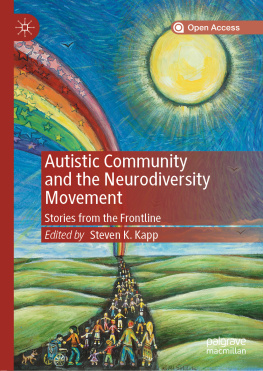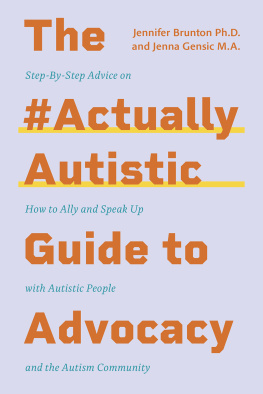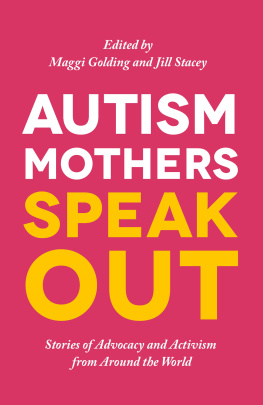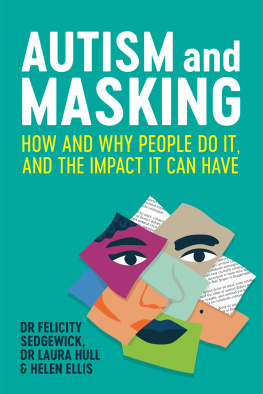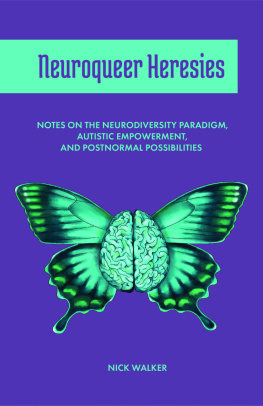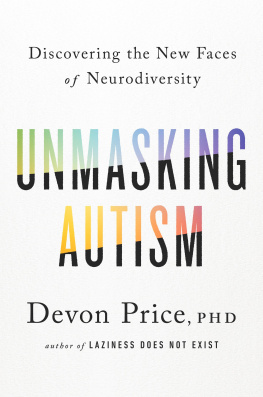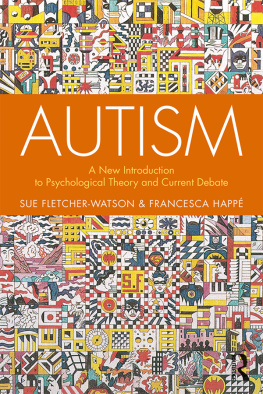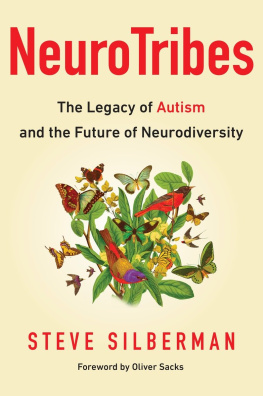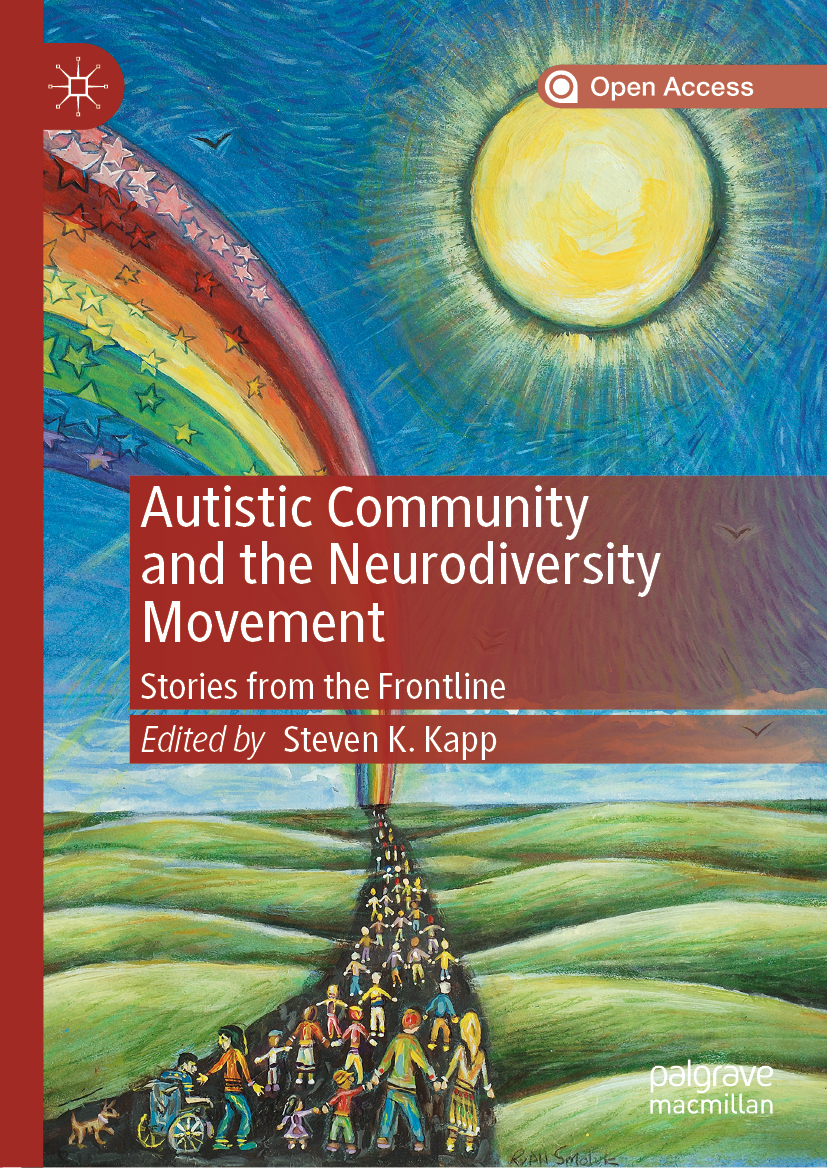Editor
Steven K. Kapp
College of Social Sciences and International Studies, University of Exeter, Exeter, UK
Department of Psychology, University of Portsmouth, Portsmouth, UK
ISBN 978-981-13-8436-3 e-ISBN 978-981-13-8437-0
https://doi.org/10.1007/978-981-13-8437-0
This book is an open access publication.
The Editor(s) (if applicable) and The Author(s) 2020

Open AccessThis book is licensed under the terms of the Creative Commons Attribution 4.0 International License (http://creativecommons.org/licenses/by/4.0/), which permits use, sharing, adaptation, distribution and reproduction in any medium or format, as long as you give appropriate credit to the original author(s) and the source, provide a link to the Creative Commons license and indicate if changes were made.
The images or other third party material in this book are included in the book's Creative Commons license, unless indicated otherwise in a credit line to the material. If material is not included in the book's Creative Commons license and your intended use is not permitted by statutory regulation or exceeds the permitted use, you will need to obtain permission directly from the copyright holder.
The use of general descriptive names, registered names, trademarks, service marks, etc. in this publication does not imply, even in the absence of a specific statement, that such names are exempt from the relevant protective laws and regulations and therefore free for general use.
The publisher, the authors and the editors are safe to assume that the advice and information in this book are believed to be true and accurate at the date of publication. Neither the publisher nor the authors or the editors give a warranty, expressed or implied, with respect to the material contained herein or for any errors or omissions that may have been made. The publisher remains neutral with regard to jurisdictional claims in published maps and institutional affiliations.
Cover image: Ryan Smoluk
This Palgrave Macmillan imprint is published by the registered company Springer Nature Singapore Pte Ltd.
The registered company address is: 152 Beach Road, #21-01/04 Gateway East, Singapore 189721, Singapore
Foreword
This book describes some of the key actions that have defined the autism rights branch of the neurodiversity movement since it organized into a unique community over 20 years ago. The actions covered are legendary in the autism community and range from The Autistic Genocide Clock through to the Institute for the Study of the Neurologically Typical , and famous pieces of work like Dont Mourn for Us.
These acts have forged new thinking on autism and established the neurodiversity movement as a key force in promoting social change for autistic people. It is primarily autistic activists who have been at the vanguard of the neurodiversity movement. All but two of the 21 contributors to this volume identify as autistic. The collection describes the biographies and rationale of key activistsin their own words, thus the motto of disability rights activism nothing about us without us is a guiding tenet for the book. The phrase (and this volume) are rooted in the concept ofstandpoint epistemology. A standpoint position claims that authority over knowledge is created through direct experience of a condition or situation. Standpoint epistemology is related to the idea of lay expertise, which is discussed extensively in the sociological literature. So, the book values the experience of autistic people as a source of knowledge about their own plight. The volume acknowledges that individual contributions are shaped by contributors political and social experience as well as their lived understanding of autism. Standpoint theory suggests inequalities foster particular standpoints, and that the perspectives of marginalized and oppressed groups can generate a fairer account of the world. Individuals from such groups are in a distinctive position to call out forms of behavior and practices of the dominant group, hopefully leading to social change. This collection illustrates the perspective of each contributors unique voice. But together, the chapters powerfully illustrate the sense of a group with a shared point of view, united in a common movement.
Enormous credit goes to the Editor, Steven K. Kapp, who bought this volume together and was able to simultaneously command the trust of the autism activist community and the respect of the academic communitynot an easy balance to get right!
The hope is this book will provide a reference text for readers interested in the history and ideas of the neurodiversity movement and how these ideas have shaped production of expert and especially lay knowledge about autism. However, the neurodiversity movement has been problematized by both parents and academics for being unrepresentative and divisive, and the book also addresses some of these critiques.
The target academic audience is primarily undergraduates and scholars in sociology, history of medicine, and psychiatry. This collection of activists stories should act as a reference text useful as a source for further academic debate and analysis. Another important set of readers are parents wishing to learn more, and of course autistic persons themselves. Our generous funder, the UKs Wellcome Trust, has supported the publication of this volume on an open access platform to make it available for free online.
The book is not a complex analysis or a celebratory piece; instead it offers raw first-person accounts, relating how and why activists have contributed. It aims to preserve and document the stories of some of the original activists whose voices helped shape and inspire the fledgling neurodiversity movement.
Enjoy!
Ginny Russell
Exeter, UK
Preface
This book has emerged from a postdoctoral research fellowship within sociology in the U.K. as part of the Wellcome Trust-funded projectExploring Diagnosis: Autism and the Neurodiversity Movement, which includes academic engagement with the movement as well as critical analysis of its position. The following chapters provide an overview of the neurodiversity movement, describing the key actions of autistic activists in the movement between 1992 and the present day, in their own words. Although previous books have provided coverage of the history of autism inclusive of the neurodiversity movement as narrated by a journalist or researcher [10, 12] or featured anthologies of contributors from autistic people published within the movement [1, 3, 9], this edited collection provides the first history of the movement from first-hand accounts of members of the autistic community and both autistic and non-autistic parent movement activists. Following my introduction to the movement and contributions, the book contains 19 chapters by 21 authors organized into parts about the forming of the autistic community and neurodiversity movement, progress in their influence on the broader autism community and field, and their possible threshold of the advocacy establishment. This is followed by a description of some critiques of the movement, and I follow with the conclusion.

